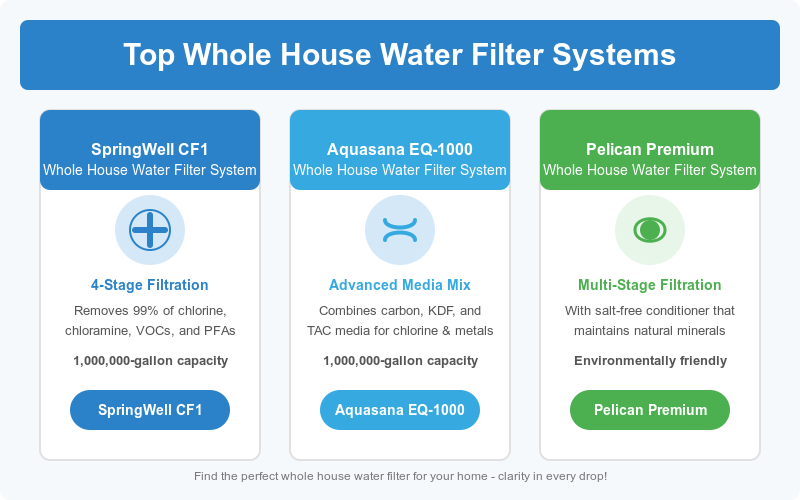Have you ever wondered how often to change your whole house water filter to keep your water clean and safe? Many homeowners assume their filtration system will work indefinitely, but factors like water quality, usage, and filter type determine how frequently replacements are needed. Ignoring timely changes can lead to reduced filtration efficiency and potential contaminants in your water supply. Understanding how often to change a whole house water filter ensures you maintain optimal performance (if you’re looking for the best replacement whole house water filter, see our quick picks below.) For a deeper dive into water filtration systems and expert recommendations, please visit our Whole House Water Filters ultimate guide.
Key Takeaways
- Lifespan Varies: Most whole house water filters last between 6 and 12 months.
- Influencing Factors: Water quality, household size, and filter type play key roles.
- Warning Signs: Reduced water pressure, off taste, and cloudy water are indicators for replacement.
- Maintenance Tips: Regular cleaning, pre-filters, and water quality monitoring help extend filter life.
- Expert Guidance: DIY replacement is common, but professional assistance may be needed for complex systems.
Understanding the Lifespan of Your Filter
Every whole house water filter has a lifespan that depends on several factors. Manufacturers generally recommend a replacement period of 6 to 12 months. However, the whole house water filter lifespan can vary based on:
- Water Quality: Higher levels of sediment and contaminants accelerate filter clogging.
- Household Usage: Larger families or heavy usage (e.g., gardening, laundry) can shorten filter longevity.
- Filter Type: Whether it’s a sediment, carbon, or multi-stage system will influence its durability.
For instance, many modern systems are engineered to perform optimally for up to 12 months when maintained. According to guidelines from the EPA, regular filter replacement is essential to ensure contaminant removal remains effective.
Best Replacement Whole House Water Filters (Quick Picks)
If you’re here because it’s time to swap out your old filter, we’ve tested and researched the top-rated options for standard systems. Whether you use city water or well water, here are a few reliable picks trusted by homeowners:
| Filter | Lifespan | Best For | Price Range |
|---|---|---|---|
| iSpring FP25B Sediment Filter | 3–6 months | High-sediment well water | $$ |
| Culligan RFC-BBSA Carbon Filter | 6–12 months | Odor & chlorine taste | $$ |
| Aquaboon 5 Micron Cartridge (4-pack) | 2–3 months | Budget replacement (Affordable water filter cartridge for standard iSpring systems, ideal when you’re on a budget.) | $ |
Note: Lifespans are approximate and can vary based on water quality and usage.
Looking for a more specific match? Keep reading for a breakdown by filter type and water quality.
Factors That Influence Filter Replacement Frequency
- Water Quality and Hardness:
- Hard water with high mineral content can clog filters faster.
- Elevated sediment levels require more frequent maintenance.
- Household Size and Water Usage:
- Larger households or those with heavy water demands often see quicker filter degradation.
- Filter Type and Technology:
- Advanced multi-stage systems tend to last longer due to enhanced contaminant management.
Tip: Monitoring these factors regularly can help you adjust your replacement schedule to maintain optimal water quality.
🔹 Real Homeowner Experiences
1. Sediment Filter Replacement Frequency:
A homeowner from New York shared their experience with sediment filters:
“We had to change the sediment filter every 3 months due to our well water. Over time, as the well stabilized, we’ve extended the interval to about 6 months.”
— Homeowner on The Garage Journal forum.
2. Carbon Filter Lifespan:
Another user discussed their carbon filter usage:
“Our carbon filter effectively removes taste and odor issues from our water. We find that replacing it every 9 months maintains the water quality we desire.”
— User review on The Garage Journal Fororum

Signs It’s Time to Replace Your Filter
Not sure when it’s time for a new filter? Look out for these common signs:
- Reduced Water Pressure: A noticeable drop in flow rate suggests the filter may be clogged.
- Off Taste or Odor: Changes in taste or smell mean the filter might not be removing contaminants effectively.
- Cloudy or Discolored Water: Loss of clarity is a strong indicator that the system is overburdened.
- Visible Build-Up: Sediment or debris inside the filter housing confirms it’s time for a change.
If you’ve noticed any of these symptoms, these could be clear signs your water filter needs changing — especially if it’s been more than six months since your last replacement.
Using these signs as a checklist ensures you know when to replace your whole house water filter before water quality is compromised.
Best Practices to Extend Filter Life
While replacement is inevitable, you can extend your filter’s performance by following these maintenance tips:
- Regular Maintenance: Clean and inspect your filter housing routinely.
- Use a Pre-Filter: Installing a pre-filter helps capture larger particles, reducing the load on the main filter.
- Monitor Water Quality: Utilize a home test kit to track your water’s condition regularly.
- Maintain Proper Water Pressure: Check for leaks or clogs periodically to ensure your system runs optimally.
These practices not only prolong the filter’s life but also help you enjoy clarity in every drop.
Replacement Schedules: A Handy Overview
Below is a table that outlines typical replacement frequencies based on filter type and usage factors:
This overview not only answers the question of how long do whole house water filters last, but also assists you in planning timely replacements.
Filter Lifespan Comparison Chart
Data compiled by AquaFilterHub from manufacturer specs and EPA guidelines.
| Filter Type | Average Lifespan | Replacement Cost (per unit) | Top Brand |
|---|---|---|---|
| Sediment Filter | 3–6 months | $10–$20 | iSpring FP25B |
| Carbon Block Filter | 6–12 months | $20–$40 | Culligan RFC‑BBSA |
| Multi‑Stage Whole House System | 12 months | $50–$120 | Aquasana EQ‑1000 |
Note: Costs vary by vendor and volume discounts.
DIY Guide vs. Professional Assistance
You might be wondering: can I change the filter myself, or should you call in a professional?
- DIY Replacement: Many whole house systems are designed for homeowners. With a bit of guidance—like our step-by-step process above—you can replace the filter yourself.
- Professional Services: If you’re not comfortable with plumbing tasks or if your system is particularly complex, hiring a professional can ensure the job is done correctly without risking any leaks or damage.
Tip: Many manufacturers offer detailed manuals and video tutorials to guide you through the process. Check those out before deciding on DIY replacement
Top Product Recommendations
Below are three top-rated whole house water filters known for their performance and ease of maintenance:
| Product | Description | Link |
|---|---|---|
| SpringWell CF1 Whole House Water Filter System | 4-stage system removing 99% of chlorine, chloramine, VOCs, and PFAs; 1,000,000-gallon capacity. | |
| Aquasana EQ-1000 Whole House Water Filter System | Combines carbon, KDF, and TAC media to tackle chlorine and heavy metals; 1,000,000-gallon capacity. | |
| Pelican Premium Whole House Water Filter System | Multi-stage filtration with a salt-free conditioner that maintains natural minerals. |

Frequently Asked Questions (FAQ)
Q1: When should I replace my whole house water filter?
A1: Most filters should be replaced every 6 to 12 months, depending on water quality, usage, and the type of filter you have.
Q2: What factors determine the whole house water filter lifespan?
A2: The lifespan is influenced by water quality, household water usage, and the type of filtration system (sediment, carbon, or multi-stage).
Q3: What are the common signs that indicate I need a new whole house water filter?
A3: Look for reduced water pressure, changes in taste or odor, cloudy or discolored water, and visible sediment build-up in your filter housing.
Q4: How long do whole house water filters last?
A4: Generally, they last between 6 and 12 months, though sediment filters may require replacement as often as every 3 to 6 months.
Q5: Should I replace the filter myself or hire a professional?
A5: If you are comfortable with DIY tasks, you can replace the filter using manufacturer guidelines. Otherwise, professional installation ensures correct setup and minimizes leak risks.
Additional Tips & Industry Insights
- According to the Consumer Reports and the EPA, regular maintenance of water filtration systems is crucial to ensure the safety and quality of household water.
- Industry Data: Studies indicate that proactive maintenance can extend the filter life by up to 20%, emphasizing the importance of regular checks.
Conclusion
Maintaining your whole house water filter is essential for ensuring that every tap delivers clean, great-tasting water. By understanding the whole house water filter lifespan, monitoring water quality and usage, and recognizing the signs that signal it’s time for a change, you can safeguard your health and optimize your system’s performance. Whether you choose to replace your filter yourself or hire a professional, proactive maintenance is the key to success.
Remember, a little proactive maintenance goes a long way. Don’t wait until you notice a drop in water pressure or a change in taste—set up a regular schedule today. For more expert advice and comprehensive reviews, visit our Whole House Water Filters guide.

Affiliate Disclosure:
Some links in this article are affiliate links, meaning we may earn a small commission at no extra cost to you. We only recommend products that meet our strict standards for quality and performance.
